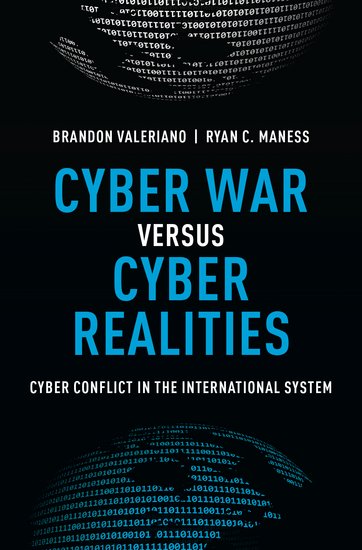Cyber War versus Cyber Realities: Cyber Conflict in the International System.
|

"This book examines the emerging art of cyber strategy and its integration as part of a larger approach to coercion by states in the international system between 2000 and 2014. To this end, the book establishes a theoretical framework in the coercion literature for evaluating the efficacy of cyber operations. Cyber coercion represents the use of manipulation, denial, and punishment strategies in the digital frontier to achieve some strategic end. As a contemporary form of covert action and political warfare, cyber operations rarely produce concessions and tend to achieve only limited, signaling objectives. When cyber operations do produce concessions between rival states, they tend to be part of a larger integrated coercive strategy that combines network intrusions with other traditional forms of statecraft such as military threats, economic sanctions, and diplomacy. The books finds that cyber operations rarely produce concessions in isolation. They are additive instruments that complement traditional statecraft and coercive diplomacy...The result will be the first broad evaluation of the efficacy of various strategic options in a digital world."
Amazon.com page
Amazon.co.uk
Oxford Global
Oxford Scholarship (all chapters available from University VPN)
Reviews
Aaron Brantly. 2020. Beyond Hyperbole: The Evolving Subdiscipline of Cyber Conflict Studies. Cyber Defense Review. (PDF)
"Brandon Valeriano, Benjamin Jensen, and Ryan Maness build upon previous efforts in their first work Cyber War Versus Cyber Realities, by continuing to develop a robust dataset of state cyber incidents in their new work Cyber Strategy: The Evolving Character of Power and Coercion, and set the bar for data-driven analysis within the subfield...Their analysis are robust and address the limits of coercive power within cyberspace. More importantly, they add quantitative rigor to a field too often dominated by conjecture and "Chicken Littles" that claim the sky is falling. By building a dataset and testing hypotheses, they rein in debate and challenge the subfield to build a more systematized foundation."
W. Kirk Wolff. 2020. Review. Proceedings: U.S. Naval Institute. November 2020 Vol. 146/11/1,413
"When I began reading Cyber Strategy: The Evolving Character and Power of Coercion, I was a bit intimidated, to say the least. Despite my apprehension, I found this book to be enlightening. In fact, I would say this is the best text I have read on the subject, for these reasons:
1. It is academic yet eminently readable, without inundating the reader with jargon.
2. It holds the reader’s attention by analyzing novel concepts of strategy and power related to cyber warfare.
3. It does not overstate the strength of cyber as a tool to coerce nations."
Giampiero Giacomello. 2018. Review. Perspectives on Politics. 16(4), 1132-1134. (PDF)
"The contribution of this book is undoubtedly original, well researched, and presented, but in a sense, it confirms what international relations and strategy students already know and expect: Add another domain and states will find ways to exploit it to their ends."
Richard Harknett. 2018. Review. H-Diplo (PDF)
"If more who read this book have that take-away and are thus better positioned to analytically unpack strategic competition in cyberspace, then Valeriano, Jensen, and Maness have done the field of cyber security studies a service. Two observations might live side by side: cyber means are not revolutionary as coercive tools, but may have strategic potential if states see them as fundamental to competition short of war. While the authors might prove correct that there has been threat inflation in the construct of cyber war, it might be equally true that a threat worthy of deep continued study and policy concern actually exists."
Ben Newsom. 2018. Review. International Policy Digest.
"They seem to be maximizing the drama of this empirical finding for an audience drowning in a sea of hysteria without data."
Podcasts and Video:
Oxford Changing Character of War talk
King's College War Studies Podcast
Enimga 2018 Video
Amazon.com page
Amazon.co.uk
Oxford Global
Oxford Scholarship (all chapters available from University VPN)
Reviews
Aaron Brantly. 2020. Beyond Hyperbole: The Evolving Subdiscipline of Cyber Conflict Studies. Cyber Defense Review. (PDF)
"Brandon Valeriano, Benjamin Jensen, and Ryan Maness build upon previous efforts in their first work Cyber War Versus Cyber Realities, by continuing to develop a robust dataset of state cyber incidents in their new work Cyber Strategy: The Evolving Character of Power and Coercion, and set the bar for data-driven analysis within the subfield...Their analysis are robust and address the limits of coercive power within cyberspace. More importantly, they add quantitative rigor to a field too often dominated by conjecture and "Chicken Littles" that claim the sky is falling. By building a dataset and testing hypotheses, they rein in debate and challenge the subfield to build a more systematized foundation."
W. Kirk Wolff. 2020. Review. Proceedings: U.S. Naval Institute. November 2020 Vol. 146/11/1,413
"When I began reading Cyber Strategy: The Evolving Character and Power of Coercion, I was a bit intimidated, to say the least. Despite my apprehension, I found this book to be enlightening. In fact, I would say this is the best text I have read on the subject, for these reasons:
1. It is academic yet eminently readable, without inundating the reader with jargon.
2. It holds the reader’s attention by analyzing novel concepts of strategy and power related to cyber warfare.
3. It does not overstate the strength of cyber as a tool to coerce nations."
Giampiero Giacomello. 2018. Review. Perspectives on Politics. 16(4), 1132-1134. (PDF)
"The contribution of this book is undoubtedly original, well researched, and presented, but in a sense, it confirms what international relations and strategy students already know and expect: Add another domain and states will find ways to exploit it to their ends."
Richard Harknett. 2018. Review. H-Diplo (PDF)
"If more who read this book have that take-away and are thus better positioned to analytically unpack strategic competition in cyberspace, then Valeriano, Jensen, and Maness have done the field of cyber security studies a service. Two observations might live side by side: cyber means are not revolutionary as coercive tools, but may have strategic potential if states see them as fundamental to competition short of war. While the authors might prove correct that there has been threat inflation in the construct of cyber war, it might be equally true that a threat worthy of deep continued study and policy concern actually exists."
Ben Newsom. 2018. Review. International Policy Digest.
"They seem to be maximizing the drama of this empirical finding for an audience drowning in a sea of hysteria without data."
Podcasts and Video:
Oxford Changing Character of War talk
King's College War Studies Podcast
Enimga 2018 Video

